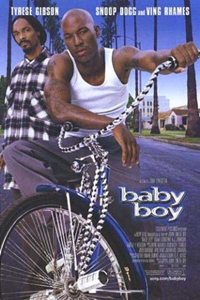Baby Boy (R) No Rating
 Ten years after his powerful Boyz N the 'Hood, director John Singleton once again travels to South Central Los Angeles to tell the story of Jody (Tyrese Gibson), a 20-year-old "baby boy" who has to grow up and face life's responsibilities.
Ten years after his powerful Boyz N the 'Hood, director John Singleton once again travels to South Central Los Angeles to tell the story of Jody (Tyrese Gibson), a 20-year-old "baby boy" who has to grow up and face life's responsibilities.
Story
Jody is a jobless but highly charismatic young man who has not only fathered two children by different women--Yvette (Taraji Henson) and Peanut (Tamara LaSeon Bass)--but still lives with his own mother, Juanita (A.J. Johnson). He wants to be with Yvette but can't quite fully commit to her and quit his philandering ways. Jody doesn't think his life is all that bad and somewhat enjoys skirting the line between boy and man. Juanita tries as hard as she can to make Jody grow up and become a responsible adult, but it isn't until a new man, Melvin (Ving Rhames), enters her life and moves into the house that Jody must face the consequences. There isn't much room for a grown kid who has overstayed his welcome, and this realization scares the heck out of him. However, the hard journey Jody embarks upon forces him to face his fears, own up to his responsibilities and finally settle down with the woman he really loves.
Acting
Singleton is known for using relatively unknown actors in his films and has generated some exquisite performances, especially from Oscar-winning actor Cuba Gooding Jr. in Boyz and from the late Tupac Shakur in 1993's Poetic Justice. This time around Singleton has found a gem in popular MTV DJ and recording artist Tyrese, who, besides some guest stints on a few television shows, marks Baby Boy as his big screen debut. Tyrese easily handles the role's dramatic requirements as well as exuding Jody's charm. And he certainly holds his own with veteran actor Rhames (much like Gooding Jr. did with Laurence Fishburne in Boyz). In one of the film's particularly tense moments, Tyrese and Rhames never say a word but the emotion is all there. The rest of the unknown cast do a fine job relaying a the everyday life of South Central L.A. and one can tell there was a true comradeship between them.
Direction
Baby Boy is certainly an interesting companion piece to Singleton's view on life in South Central Los Angeles and the director calls this film his third in a trilogy about the "'hood." Boyz was obviously his most heartfelt and most compelling. The film explored a world of an African-American family life in a violent South Central neighborhood that the audience had never really seen before. And Singleton did it with such finesse that one wonders why those techniques are not as prevalent in his follow up films, including the second installment, Poetic Justice. He may have given all he had in his first film--Baby Boy also misses that powerful punch. The story doesn't hold many twists or turns, but rather slowly goes through the motions, showing things we've basically seen before--and done better. It may appeal to a particular group but won't hold the attention of a broad audience, like Boyz did. And maybe it can't. Once you've seen the harsh reality of such a life, why see it again?
Bottom Line
If you don't mind revisiting South Central L.A. for a couple of hours to see how the boyz are doing, then Baby Boy is worth the 10 bucks.
To get the full Quicklook Films experience, uncheck "Enable on this Site" from Adblock Plus
box office top 10

Civil War Released: April 12, 2024 Cast: Kirsten Dunst, Wagner Moura 25.7M

Godzilla x Kong: The New Empire Released: March 29, 2024 Cast: Rebecca Hall, Brian Tyree Henry 15.5M

Ghostbusters: Frozen Empire Released: March 22, 2024 Cast: Paul Rudd, Carrie Coon 5.8M

Kung Fu Panda 4 Released: March 8, 2024 Cast: Jack Black, Viola Davis 5.5M

Dune: Part Two Released: March 1, 2024 Cast: Timothée Chalamet, Rebecca Ferguson 4.3M

Monkey Man Released: April 5, 2024 Cast: Dev Patel, Sikandar Kher 4.1M

The First Omen Released: April 5, 2024 Cast: Nell Tiger Free, Bill Nighy 3.8M

The Long Game Released: April 12, 2024 Cast: Dennis Quaid, Gillian Vigman 1.4M

Shrek 2 Released: May 19, 2004 Cast: Mike Myers, Eddie Murphy 1.4M

Sting Released: April 12, 2024 Cast: Alyla Browne, Ryan Corr 1.2M






